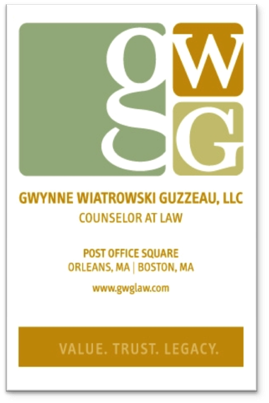Scared of Probate No More: Good news about death and dying in Massachusetts for 2012!
by Gwynne Wiatrowski Guzzeau
On March 31, 2012 the new Massachusetts Probate Code will become effective, reforming burdensome practices and procedures currently in place for the settlement of estates after death.
So, what does this mean for you? Surprisingly, it's good news!
What is "probate"?
Probate is the process by which the person that you've named as a Personal Representative (formerly known as an "Executor/Executrix") is appointed by the probate court to act in accordance with the terms of your last will, to dispose of any assets owned in your individual name at the time of your death. Assets that you own jointly or that have a named beneficiary who will be paid upon your death (e.g. IRA, life insurance) are not part of your probate assets.
What are some highlights of the new Probate Code?
First, the new code offers an informal process with minimal court involvement, and minimal delay to get appointed as Personal Representative (the new term for executor).
For most individuals and families, deciding to file an informal probate will make the most sense, assuming that the last will is uncontested. However, informal probate is not permitted if there are minor children or an incapacitated spouse among the survivors.
The formal probate process that exists today will be available for contested estates, estates where there is no last will, and cases where clients decide (or their attorneys advise) that court oversight throughout the entire process is desirable.
Estate lawyer Gwynne Waitrowski Guzzeau brings some legal ease to the ever-changing laws that are now going into effect.
If problems do arise during the course of administering an estate under the informal probate procedures, then any interested person – including the Personal Representative – has the option to change to the formal process in order to involve the court.
Second, in uncontested matters, trusts that are established by the terms of your last will no longer need to submit annual reports to the court after your death. Instead, trustees of such "testamentary trusts" are required to account only to the beneficiaries of the trust. Again, if problems arise, an interested party can petition to require further court involvement.
Third, under the new laws, if you leave a signed list or statement regarding your wishes for the distribution of your tangible personal property (i.e. the stuff in your house), then that written statement has a binding effect.
In addition to the practical benefits offered by these changes, consumers benefit because these reforms eliminate the sales pitch for lawyers who want to sell you a separate "living trust" document simply to avoid the delays of probate or the burdens of court oversight.
Living trusts (i.e. revocable trusts) may be suitable for your circumstances, just make sure you're choosing one for the right reasons and not because you're afraid of probate.
This is a brief summary of just a few of the changes in the Massachusetts probate laws that go into effect March 31, 2012. It is not intended as legal advice. The reforms were enacted to increase flexibility in estate planning and estate settlement, so consult an estate planning attorney if you have further questions or want to take advantage of these changes.
Additional information is available at the Barnstable County Probate Court website.
Gwynne Wiatrowski Guzzeau is a lawyer and entrepreneur. She lives with her family in Orleans.
If you have questions for Gwynne please email the Editor at CapeWomenOnline.
You can also visit Gwynne's website at www.gwglaw.com
 |

